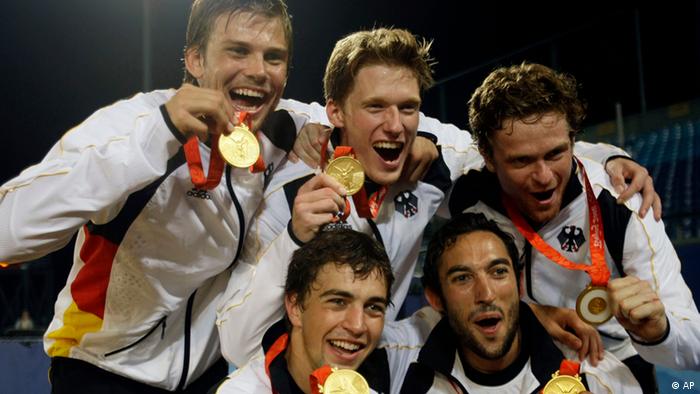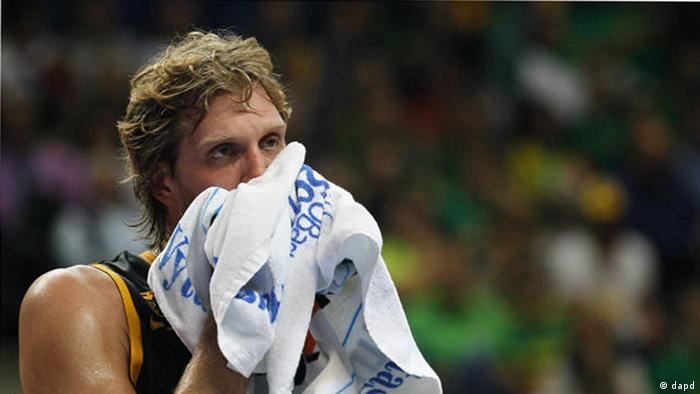Germany is sending just three squads to the Olympic Games in London. Some coaches say German sports organizations need more state support and a better system for developing solid teams.
Thomas Bach, head of the German Olympic Sports Confederation (DOSB), has long been aware of the dilemma. He wants to take a closer look at the issue of German team sports once the 2012 games in London are over. The only German teams heading for the Summer Games are the men's and women's field hockey squads along with the men's volleyball team.
Germany's soccer, basketball, water polo and handball players will all be sitting at home when the medals get handed out.
Seeking state support
Germany's soccer, basketball, water polo and handball players will all be sitting at home when the medals get handed out.
Seeking state support
Dirk Bauermann, longtime trainer for the German men's basketball team, thinks he knows what the problem is.
"State support makes the difference," he told daily newspaper Westdeutsche Allgemeine Zeitung.
Bauermann added it is absolutely necessary to get the ball rolling on state sponsorship. If that does not happen, he warned, Germany will see its national basketball, volleyball and handball teams sidelined more often in the future.
Even with the help of superstar Dirk Nowitzki, Germany's basketball team failed to qualify for the London Olympics.
Bauermann added it is absolutely necessary to get the ball rolling on state sponsorship. If that does not happen, he warned, Germany will see its national basketball, volleyball and handball teams sidelined more often in the future.
Even with the help of superstar Dirk Nowitzki, Germany's basketball team failed to qualify for the London Olympics.
Martin Heuberger, trainer for the German national handball team, also thinks a new course of action is necessary. He told German sports news agency Sportinformationsdienst (sid) that local associations and leagues have to work together on behalf of Germany's young athletic talents.

Other German teams have a hard time getting their act together, but German field hockey continually takes home gold
Hockey an exception
So why is field hockey different? German field hockey teams have been regular medal winners and hope to score even more victories in 2012. Men's trainer Marcus Weise gave DW one possible explanation.
"You shouldn't forget that we have a very different starting point," he said. "We have the luxury of being an amateur sport, so I have much greater access to my players. I can work on their performance and develop the team - in contrast to my colleagues in the professional sports. I think that's the main difference."
"You shouldn't forget that we have a very different starting point," he said. "We have the luxury of being an amateur sport, so I have much greater access to my players. I can work on their performance and develop the team - in contrast to my colleagues in the professional sports. I think that's the main difference."
While Weise sees his players' amateur status as a boon, other German sports associations complain about a lack of professionalism.
German football faces a different kind of problem. Though accustomed to success, the German women's team lost to Japan in the quarter-finals of last year's FIFA Women's World Cup. The German squad didn't even qualify for the London games.
On the men's side, Olympic quallifying rules present an obstacle. Only under-21 teams can play in European qualifiers, but Germany's under-21 squad keeps losing players to the national team.
Calling for solidarity
On the men's side, Olympic quallifying rules present an obstacle. Only under-21 teams can play in European qualifiers, but Germany's under-21 squad keeps losing players to the national team.
Calling for solidarity
As the coach of successful field hockey teams, Marcus Weise has some advice for other sports.
"The deciding factor is always the structure of the cooperation between the clubs and the national team," he said. "I advocate for a more unified approach."
"The deciding factor is always the structure of the cooperation between the clubs and the national team," he said. "I advocate for a more unified approach."
With so few teams in competition, this year's German Olympic delegation of 400 athletes will be the smallest since the country's reunification in 1990.
Author: Tobias Oelmaier / gsw / ew dw de
Editor: Shant Shahrigian
Author: Tobias Oelmaier / gsw / ew dw de
Editor: Shant Shahrigian


No comments:
Post a Comment